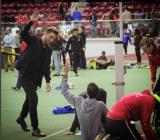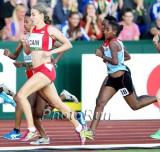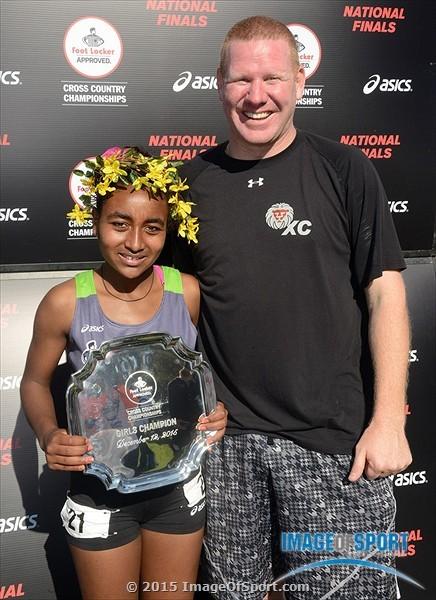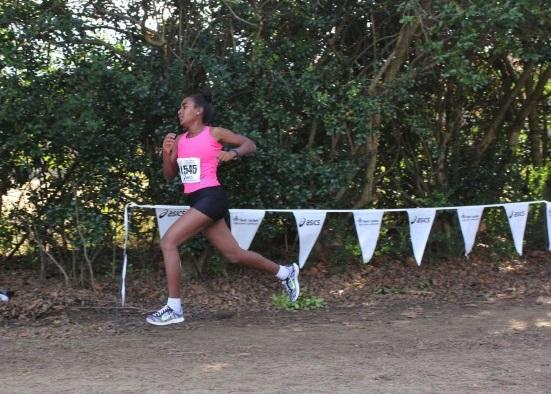Folders |
Weini Kelati's Bell Lap - Dave DevinePublished by
Weini Kelati’s Bell Lap A year removed from her last race, Weini Kelati has surged toward education By Dave Devine, for DyeStat
Weini Kelati has been here before. She knows the pressure of a close finish. She knows what it’s like to battle and surge and give everything you have, and still find yourself in a desperate drive to the line. She cleared the final rise at the 2015 Foot Locker Cross Country Championships, having led the entire race, finish line in sight, redemption at hand, only to have Maryjeanne Gilbert narrow the gap in the closing meters. She knows what it’s like to will herself through a gauntlet of fans under the blare of a loud speaker: Gilbert, trying to close it! Gilbert giving it everything she’s got…Kelati trying to hold on! She knows how it feels to summon one final push. She was the one clinging to a narrow lead in the 2016 New Balance Nationals Outdoor 2 Mile, Nevada Mareno looming off her shoulder through the final curve, crowd on its feet, stadium announcer stirring the pot: And now they’re flat out! Weini Kelati and Nevada Mareno—here they come! She knows the value of a final gear. Kelati has been to the wire before. But this was different. She couldn’t count on her feet for this one. She couldn’t depend on her considerable endurance or her Sunday long runs or the cardiovascular engine her coach once described as lungs on legs. She couldn’t rely on a fast start or a furious finish. Foot Locker Nationals? Nevada Mareno with a hundred meters to go? Those were races. Important, yes. Exciting. The thrilling outcome of lengthy preparation. But still — athletic endeavors. This was life. This was three years of accelerated classes and weekend supermarket shifts and Sunday afternoon tutoring sessions. This was late night cramming and early morning reviews and a skipped prom and more skipped runs than she cared to count. This was the one thing Meb Keflezighi had talked about, when she asked the Olympic marathoner for advice and guidance. Education. Education first. Then everything else.
* * *
The blueprint for Kelati’s academic bell lap was formulated exactly one year ago, on a long drive in a road-weary Toyota Camry. It was mid-June, 2016. Heritage High coach Doug Gilbert and his wife, Audrey, were driving Weini from Leesburg, Virginia, to Greensboro, N.C., site of the annual New Balance Nationals Outdoor track meet. They departed two days before Weini was slated to open in the 5,000-meter race — a competition she would win handily in 16:24.69 — and they filled the unfurling highway miles with talk of Weini’s future, attempting to plot a path forward for the young Eritrean runner. There was plenty to discuss. Already 19 years old as a high school junior, Weini would turn 20 the following December, rendering her ineligible, according to Virginia scholastic rules, to compete in cross country or track for the entirety of her senior year. Gilbert and his wife had been proffering counsel, advice and a variety options for months, but all of the revolving conversations finally coalesced on that road trip to Greensboro.
Returning to Heritage meant the reigning Foot Locker champion, indoor 5,000-meter national record holder, and four-time New Balance titlist would essentially spend a year on competitive ice, sequestered from the spotlight of national prep meets and the concomitant recruiting opportunities. Big-time collegiate programs might develop cold feet. Once ardent coaches might stop calling altogether, reluctant to drop a full ride on a sidelined 20-year-old talent. Going the community college or junior college route carried similar, if different, risks, and meant Weini would have to forsake a vision she’d nurtured of a senior year with friends at Heritage and a direct jump to a Division 1 program. Ultimately, the decision was Weini’s. “She had the option to just go to community college and get her G.E.D.,” Gilbert says. “And then go to junior college for two years and get started earlier. She was absolutely adamant that she would stay in high school and wanted to go to a Division 1 school right away.” Everyone in the car was clear about the difficulty of that decision. Weini would need to overload on core courses when some of her classmates would be coasting. No room for electives. She would take junior and senior English simultaneously, learning literature and language at the same time. She’d need study halls and study guides and study partners. Tutoring and test assistance. Perhaps most daunting, she would need to pass, in a variety of subject areas, the Standards of Learning (SOL’s) required to earn an advanced high school diploma in the state of Virginia. There was no way around those testing requirements. Some weeks, there would be no time for running. Certainly, no time for attaining race sharpness. Weini would not be holding off anyone in the homestretch. She wouldn’t be profiled in the newspapers or featured on the running websites. The Foot Locker laurels and New Balance All-American crowns were already a thing of the past, but a year of singular focus on academics meant the very thing that earned her those accolades would also have to wait. If she went this route, there was a good chance she wouldn’t experience the joy of breaking the tape for quite some time. Weini was all in. “I had to focus on school this year,” she says. “And with the SAT and the SOL’s and classes this year, it meant focusing completely on that.” Gilbert was equally committed to his young charge’s chosen path. “I’m still helping her get over the finish, it’s just that the finish line has changed.”
* * *
“After 25 years of rule by unelected President Isaias Afwerki, Eritrea’s citizens remain subjects of one of the world’s most oppressive governments.” · Human Rights Watch, 2017 World Report: Eritrea
If Weini is reticent to speak in detail about her reasons for seeking asylum in the United States, it is not difficult to imagine what some of those reasons might be. Hailing from a small farming village in Eritrea, a nation bordering Sudan and Ethiopia in the Horn of Africa, Weini represented her country at the 2014 IAAF World Junior Championships in Eugene, Oregon, finishing eighth in a 3,000-meter race won by Mary Cain.
That cousin, Amselom Teklai — himself a talented harrier and 1997 Foot Locker finalist — welcomed Weini to his home, along with his wife, Luchia, and their three small children. In September 2014, Weini enrolled as a sophomore at nearby Heritage High, and Teklai approached Coach Gilbert about Weini joining the cross country team. A year later, during the same months Weini was winning a Foot Locker trophy and procuring a quartet of New Balance titles, a special United Nations Commission of Inquiry was unearthing sufficient evidence to conclude that the Eritrean government, under longtime president Isaias Afwerki, had “committed numerous crimes against humanity.” Against a backdrop of protracted conflict — particularly with Ethiopia to the south—and a severe drought that has crippled a largely agricultural economy, Afwerki’s regime has engaged in media repression, religious persecution, arbitrary imprisonment and extrajudicial torture. Additionally, according to the Human Rights Watch World Report 2017, “By law, each Eritrean is compelled to serve 18 months in national service starting at 18, but in practice conscripts serve indefinitely, many for over a decade. Endless conscription remains a principal driver of migration. The (UN Commission of Inquiry) concluded that conditions of national service rise to the crime of enslavement.”
* * *
She could have gone for a high five. That’s what most of the other girls were doing. A handshake or a fist bump might have sufficed. But when Weini ran out for her practice introduction at the 2015 Foot Locker Nationals, rehearsing the short jog from her South team area to the starting line for the next day’s race, and she saw Meb Keflezighi standing along the marked path, she didn’t hesitate. She ran beaming into his waiting embrace. How could she not? A year earlier, during her first trip to the national championship, she arrived as a relative stranger to most of the attendees. Speaking little English, and somewhat overwhelmed by the trappings in San Diego, she soon found support from an unexpected source.
“I didn’t speak English much that year,” Weini acknowledges, “and when I met him, I knew he was a great runner, a famous guy. In my dreams, I didn’t imagine I would see him. And then to find out he spoke Tigrinya too, that was a great moment.” Gilbert, who accompanied Weini both years to the Foot Locker meet, recalls that first meeting. “She was the only kid in the dining room who wasn’t sitting with her team, she was sitting with Meb’s family. It was really comforting to be around people who were part of the running community, but who could speak her language with her.” With the Tigrinya language as a starting place, the two connected over running goals and ambitions. Eventually, Weini sought Keflezighi’s advice on the big question looming in her life. “I asked him, what should I do?” she recalls. “And he said, ‘You know Weini, the great thing is to put education first. If you put education first, you can do anything you want in the future.’ So, he really encouraged me.” Gilbert believes that Keflezighi’s counsel factored into Weini’s eventual decision to complete her diploma at Heritage, even if it sidetracked her athletic career for a year. “The main thing Meb told her is that education is the way to success,” Gilbert said. “I think that meant a lot to her, and she’s followed through on that.”
* * *
Rita Driskill is a relative newcomer to the faculty at Heritage High, but she’s been teaching in the Leesburg area for more than 30 years. One of her roles at Heritage this year is to facilitate a “differentiated study hall” for students requiring additional assistance with Algebra 2. After three decades in the classroom, there isn’t much she hasn’t seen. The first thing the veteran educator had to do when Weini arrived in her study hall was teach the senior how to use a calculator. “She told our class, ‘The calculator was illegal in my country,’” Driskill remembers, “and my first thought was that it was a vocabulary issue. She just meant they weren’t allowed to use them. But as she talked about her schooling, I realized that she actually never did have one. They were expected to do everything in their heads.” That meant Weini had a solid foundational background in mathematics, but she was ill-prepared for the learning expectations contained in the Standards of Learning. Once Weini gained proficiency with the calculator, student and teacher were able to zero in on the primary focus of the study hall: Achieving a passing score on that Algebra 2 SOL. Weini would have four opportunities to pass the test. Her first two attempts fell short. “The first time she took the SOL,” Driskill recalls, “she said she was ashamed, because she knew I was working so hard, and she felt she let me down. I had to let her know it’s not about me, that I had confidence in her.” With time running short as the spring semester wore on, Driskill became part-cheerleader, part-instructor, part-weekend tutor. “I just kept saying to her, you can do this, you can do this. She said, ‘If I can pass this Algebra 2 SOL, that means…anything is possible.’ It still sends chills up my back.” As if the academic challenges weren’t enough, Weini was holding down shifts at Giant supermarket. She started as a bagger and progressed quickly to cashier in the checkout line, where patrons frequently recognized her from local coverage of her running exploits. The combination of work and school made for long days and longer nights. Gilbert, who no longer coaches at Heritage but remains a mentor to Weini, notes, “she’s often staying up until two or three in the morning to make sure she gets everything done and she’s prepared for the next day.” Driskill has seen that dedication as well. “She’d work all day on Sunday, and then I’d go to her house and tutor her for a couple of hours, and then the next day she’s lining up with me again in study hall.” That singular focus meant bypassing some typical senior rites of passage. “The Algebra 2 SOL was scheduled for Monday after prom,” Driskill recalls, “and she told me that she was going to be studying all weekend.” Weini offers a resigned laugh when the topic of prom comes up. “I never really spend my time at parties or things like that. That’s the only thing I did not do. I always am focusing to do my work, instead of being out with my friends for a night.” After another gentle laugh, she adds, “Yeah, there was no fun like that.” Late in the spring, all the hard work paid off. “The third time was the charm,” Driskill says of Weini’s passing effort on the Algebra 2 SOL. “It was within the last two weeks of school. Right to the end.” And it wasn’t just the standardized Algebra test. “She got all her tests passed,” Gilbert says, “which you can imagine is a challenge for someone who’s still learning the language, but she’s done a great job this year.” Weini, understated in her own assessment, chooses her words thoughtfully. “It was a very hard year for me, but I’m happy that I’m getting through it.”
* * * These days, when time allows, Weini mostly runs alone. With a mileage appetite that tends toward the high end (she topped 80 miles a week in the run-up to Foot Locker 2015), she has managed 70 miles some weeks, but has tended to hover just north or south of 50 the majority of the year. Some weeks, when the school work and the supermarket shifts stack up, there’s no running at all. According to Driskill, Weini didn’t manage any mileage between her first attempt at the Algebra 2 SOL and her third, successful, try. “I said, ‘Really? I would think you’d need to run relax,’ and she said, ‘I needed to concentrate on this. I’ll run tomorrow. I’ll sleep tonight, but I will run tomorrow.’” Weini relates a similar story, noting that on her first run back she knocked out an easy nine miles in 65 minutes. “If I stop for work and school work,” she says, “I still can get back in shape in three or four days. It doesn’t take long.” Racing has been a different story. Although there were initially plans for Weini to run unattached in collegiate or open competitions, those intentions never came to fruition. “She wanted to race,” Gilbert says. “We were targeting Camel City in late January, going down to North Carolina to run the JDL Fast Track, but January and February were tough months for her, making sure she was on track (for graduation). As far as I was concerned, as her coach, if she’s not 100 percent ready, then there was no reason to put her out there. And she agreed with that.” As the anniversary of Weini’s triumphant, 0.06-second victory in the New Balance Nationals Outdoor 2 Mile approaches, a moment that cemented her place as the dominant female distance runner of the 2015-16 campaign, that moment has also come to signify the last time she laced up her spikes for competition. Weini doesn’t seem particularly concerned about that. “Yes, my last race was New Balance Nationals, but I feel like if I run six days without stopping, I’m already in good shape. It’s not hard for me to get it back.” Her mentor and coach takes a slightly more measured response when asked whether he thinks Weini has missed racing the elite fields she faced on a regular basis last year. “I think she has,” Gilbert says, “but I think it’s just going to make her hungry when September rolls around. The first time she gets to put the spikes on and get out and race, I think it’ll pay off.”
* * *
When September rolls around, Weini will again be a long way from Leesburg. In a year devoted almost entirely to academics, Weini’s one significant contribution to the prep running news cycle came last fall, when she posted a brief tweet on Nov. 3, 2016: Blessed to announce my commitment to the University of New Mexico to further my academic and athletic career! #golobos
New Mexico, which claimed its first NCAA cross country title in 2015, the same season Weini was authoring her triumphant march to Foot Locker, remained committed to the young Eritrean through a recruiting process that saw other suitors wax and wane. It didn’t hurt that when Weini took her official visit, everything felt right. A young woman who had spent three years redefining the meaning of home, emerged with yet another iteration. “It was perfect, that time,” she says. “Everything was a surprise to me; I wasn’t imagining it could be like that. I feel like it was a home.” When she fills in the details of that trip, she sounds more like a college counselor than a high school senior. “When you get a college visit, you have to compare everything. What is the best fit for you? Of course, you’re going to like every college that you visit, but you have to make sure they have what you need,” Weini said. “When I went out there, I spend time with the team. I did my own practice because they could not give me their schedule, but they were running nearby, so I got to watch them work out. “But I am choosing education first, right? So, I have to ask about the education. Did they have the things I need for my major? I saw they had the programs I was looking for.” Now that she’s committed to New Mexico, with plans to major in nursing, the same Twitter feed that broke the news of her signing is populated with posts and retweets about the accomplishments of her future teammates. “If they have a race,” she says, “I put it on my schedule to watch on the Internet, to see how they’re running. I like to cheer them on and watch their races.” Already looking ahead to the demands of collegiate training and competition, Weini knows she’ll spend the coming summer months in deepening preparation. “She doesn’t miss a beat,” Gilbert says, “and I don’t expect this to be any different. It’ll be a summer of running and working. And saving up money, because a big part of everything Weini does is a focus on, not just the near future, but long term and being able to help her family out as much as possible.” * * * Weini Kelati is on the homestretch. The finish line is in sight. There is no fluttering tape emblazoned with a shoe company logo. No digital clock, churning toward a record. No one waiting to coronate her with a cardboard crown. There is a diploma. A scholarship waiting. The simple, clean pride of achieving a goal set long ago, in a well-traveled Camry. A conversation in which the dreams of a 19-year-old girl and the needs of a family in Eritrea and the advice of an Olympic marathoner and the counsel of a coach and the mothering of his wife and the guidance of a cousin and the care and concern of an entire community came together and intersected. What’s best for me? Best for my family? Best for running? Best for the future? In the end, it seems, a bell lap is a bell lap. Intervals or integers, fartlek or functions, long runs or long division — they were the same. Each challenging in its own way, each requiring the same essential tools: Discipline. Desire. Dedication. “She’s so dedicated when she sets her mind to it,” Gilbert says. “I cannot say enough about her as an individual,” Driskill says. Weini Kelati is, again, a girl in transition. Soon to depart one adopted home for another. Leesburg, once so foreign, will be difficult to leave behind. Now, when Weini runs along the back roads and main streets of town, complete strangers honk and wave. Shoppers at the Giant supermarket hug her in the checkout line. Everyone at Heritage loves her — faculty and students alike. Her cousin’s children clamor for her when she arrives home each afternoon. She has surrogate mothers and stand-in fathers, at school and at home. Teachers, coaches, cousins and teammates. “Of course,” she says, “I miss my mom and my brothers, but I feel like I have a real family here, too.” And when Weini Kelati stands at the 2017 Heritage High graduation to accept her diploma — a ceremony that might have been difficult to envision even 12 months ago — that family will be roaring her home. Just as they always have. “Among all other the victories she’s had,” Gilbert says, “watching her walk across the stage and get that diploma is the most exciting thing I’ll see her do.” More news |














 “We had already been discussing her options as far as education goes,” Gilbert recalls. “On that trip, we spent hours picking apart what her choices would entail.”
“We had already been discussing her options as far as education goes,” Gilbert recalls. “On that trip, we spent hours picking apart what her choices would entail.”  After the competition concluded, she did not return to Eritrea with the national team. Difficult as it was, she did not go home to her mother and brothers. Instead, she made her way to the home of a third cousin in Leesburg, Va., and applied for asylum.
After the competition concluded, she did not return to Eritrea with the national team. Difficult as it was, she did not go home to her mother and brothers. Instead, she made her way to the home of a third cousin in Leesburg, Va., and applied for asylum. The famed Olympic marathoner, Keflezighi — himself a former Foot Locker finalist — was in attendance with his family, serving as a race ambassador. Like Weini, Meb had made his way to the United States from Eritrea at a young age. They were joined by a common culture, a shared experience of displacement, and perhaps most importantly — the same language.
The famed Olympic marathoner, Keflezighi — himself a former Foot Locker finalist — was in attendance with his family, serving as a race ambassador. Like Weini, Meb had made his way to the United States from Eritrea at a young age. They were joined by a common culture, a shared experience of displacement, and perhaps most importantly — the same language.

